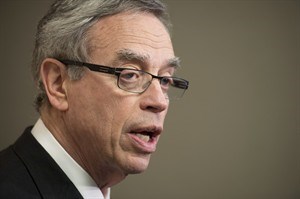
Natural Resources Minister Joe Oliver says the government is encouraged by the outcome of the U.S. State Department's final environmental impact study on the Keystone X-L pipeline. THE CANADIAN PRESS/Frank Gunn
February 01, 2014 - 3:00 AM
OTTAWA - The Conservative government received some much-needed good news this week in the form of the U.S. State Department's massive and benign final assessment of the proposed Keystone XL pipeline.
Ever since Stephen Harper called American approval of the $5.4-billion pipeline from Alberta to the U.S. Gulf Coast a "no-brainer" back in September 2011, a lot has been riding on the eventual vindication of the prime minister's thinking.
By January 2012, Natural Resources Minister Joe Oliver had elevated pipeline politics — and the diversification of the country's foreign energy markets — to "an urgent matter of Canada's national interest."
Throw in the steady stream of Canadian supplicants to Washington on the Keystone file, a multi-million-dollar government ad campaign aimed at U.S. decision makers and consumers and, most recently, Foreign Affairs Minister John Baird's impolitic push for U.S. President Barack Obama to make up his mind, and the whole saga is taking on the aura of a slow-motion policy sink hole.
With 2014 shaping up as the year the Conservatives need to find some pre-election traction on their bedrock — dare we say, keystone — energy policies, the State Department assessment buttresses many of the government's long-standing arguments.
"The benefits to the U.S. and Canada are clear," Oliver said Friday after the pipeline study was released.
"We await a timely decision on this project."
He'd best not hold his breath.
Eight other U.S. federal agencies have 90 days to comment on the State Department report and the president can then ruminate for as long as his political calculus deems necessary.
"The file has been caught up in a political dynamic that goes beyond a rational exchange of numbers," said David McLaughlin, a former president of the National Round Table on the Environment and the Economy and chief of staff to Finance Minister Jim Flaherty.
Certainly the environmental movement is talking past the State report as though it was just another partisan news release.
"If President Barrack Obama truly wants to be able to tell his kids he did everything he could to combat climate change, then he must reject this pipeline because it is a fuse to one of the largest carbon bombs on the planet," Mike Hudema of Greenpeace Canada said in a release late Friday.
The report says nothing of the sort.
Against that incendiary rhetoric, the Conservative Party of Canada responded with its own jeering web advertisement Friday within minutes of the State report's release.
"Now American billionaires are using their wealth to attack our oil industry," says the minute-long Conservative ad. "The distortion of facts and hysterical fear-mongering has to stop."
The ad was apparently in response to U.S. billionaire Tom Steyer, who has been a vocal opponent of Keystone XL.
And so while the State report should give the Harper government critical credibility on a key file, the benefits may be diluted in a political swamp.
Liberal Leader Justin Trudeau, a supporter of the Keystone project, said the State report shows opposition to the pipeline "is not scientific, it's political."
"It is a failing of our prime minister to actually make a proper case for the Keystone XL pipeline by demonstrating that you cannot separate the economy and the environment."
New Democrats, who oppose Keystone, made much the same allegation.
"The Conservative government's bumbling approach to oil sands development has given Canada a black eye and hurt our relationship with our closest ally," said NDP energy critic Peter Julian.
What is emerging is a consensus among pipeline supporters and detractors alike that the Harper government's take-no-prisoners approach to promoting energy extraction has built a cage of its own.
McLaughlin is among those who note that Canada hasn't provided Obama much of an incentive, let alone political cover, to act.
If the president has "punted," the Keystone decision — to use Harper's recent description — the prime minister has repeatedly punted regulations on oil and gas sector emissions his government first promised in 2007.
Conservatives have also torched some environmentalists as being akin to terrorists, reduced environmental assessments and loudly derided an NDP cap-and-trade proposal as a job-killing tax grab.
Against that stands a U.S. State Department report that, in McLaughlin's assessment, is "good news for the (Keystone XL) project."
"There's now a clear environmental impact assessment on emissions and climate that shows it's not as negative as many environmental groups have pointed out," he said.
"But until and unless we can turn the Obama administration to Canada's corner in terms of making a positive argument that will cause the president some (domestic) political difficulty ... we have to look back over the years and say, have we invested enough political capital in return?"
McLaughlin sees it as a rhetorical question, given the current impasse — a question the State Department report can't answer.
"In that sense, I don't think anything politically has changed from yesterday to today."
News from © The Canadian Press, 2014